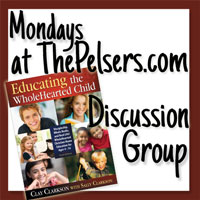We're in chapter 5 of Educating the Wholehearted Child this week.
“… to be educated is something you become. A truly educated child is one who has the desire and the ability to learn and grow as a whole person. The desire to learn (will) is from the heart; the ability to learn (skill) is in the mind.” – page 73
One of the foundational ideas of the Charlotte Mason teaching philosophy is that “children are persons.” Even my four year old is a person and should be treated as such. He is also educated because he has a desire to learn more about the world around him, not because he has sat in a classroom for a minimum number of hours.
“The true test of a child's education is not what they know at any one time relative to what other children know (or don't know). It is whether or not the child is growing stronger in all of the most important learning skills – the skills that enable them to acquire knowledge, insight, and ability and to educate themselves independently.
…
“The goal should be to exercise all of a child's mental muscles so they enter adulthood with a strong mind and the will and skill to learn whatever is necessary.”
pg. 75
In North Carolina, we are required to test yearly. This terrifies me to an extent, making me feel like I have to prove myself, my teaching, and my child to those in authority. Thankfully this is more of a formality at this time than anything else. The real goal in my home should be to see progress each year. The real goal is how well my child can educate himself and how much he desires learning.
There are seven mental muscles described in the chapter. These are the muscles that we should be exercising and teaching our children to use for themselves.
- Language
- Appetites
- Habits
- Creativity
- Curiosity
- Reason
- Wisdom
Some things that we've made priorities with our boys from the time Jonathan was a baby were to talk to our children like they were people from the time they were born and read to them. I don't mean that we don't do some sounds and imitation type babbling at times when they are babies, but we were intentional about using full sentences and having conversations with them from birth. There are books everywhere in our home. My boys rarely see me without a book in my hand. Books are also accessible to our boys. At ten months, even Jacob goes to the book baskets and will sit for 5-10 minutes at a time on his own and flip through the board books.
We've also tried to outlaw the phrase “I don't know.” It is alway met with responses like, “let's figure it out” or “what do you think the answer could be?” Josh and I try to lead and guide the boys to answers rather than handing them answers. When they are interested in something, we search for more info in books or on the computer. We open things up to see how they work. We find ways in our every day lives to reinforce things that we're learning in school.
How do you teach your children to educate themselves? How do you exercise these muscles in your home?
{Would you like to lead a chapter? There are chapters still available.}
.png)

